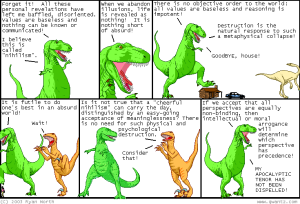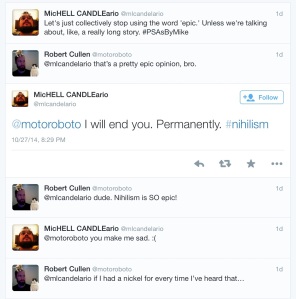Objective Morality and “Living Without Morals”
As you can probably tell from my previous post, I’ve been spending some time looking into atheism and the similarities between it and nihilism, and one similarity that I’ve come across that grabbed my attention was the theistic argument for objective morality. Basically, objective morality is the idea that there is a set of universal morals that prove to be factually true in all scenarios, forever. This usually works into religion because a deity of some kind implements these moral laws that are presented in whatever holy text is particular to that religion. Jehovah in the bible, sets forth 10 commands that should ALWAYS be followed. Those commandments are considered objective morals.
What atheism and nihilism share is the rejection of moral absolutes. Atheism, because of its lack in a belief in any supernatural beings to assert said laws, and nihilism for basically the same reason. A theistic “argument” for the existence of moral absolutes is that, (and I’m paraphrasing here) “if absolute morals don’t existence don’t exist, than what’s keeping anyone from doing whatever they want, whenever they want? Since there are no God-given moral guides to keep humanity in check than what is the problem with murder, rape, etc.”
The answer that seems to baffle those asking the question is, “nothing”. We don’t kill each other for no reason because it goes against (the majority) of our instincts. We share and help one another because it benefits the tribe and propagates the species. Humanity is designed (just a figure of speech) to do what benefits not just a singular person, but the most people possible. If we didn’t have those instincts we wouldn’t have survived this long as a species. We form subjective morals based off these instincts and societal consensuses. Laws are created not because some mythical sky daddy said so, but because it is what most people believe will result in a healthier society. Just because someone doesn’t accept proposed universal moral absolutes doesn’t mean that they’re going to automatically reject all preconceived morality.
Living without the belief in absolute morals won’t give any mentally sound person an excuse to do horrible things just because. Morality is derived from man, and as such suffers from imperfections, and varies from culture to culture. It is affected by outside forces and advancements in thought. I could get into why moral absolutism doesn’t make too much sense on it’s own merits, but for now I’ll leave it as a defense of moral subjectivity.


